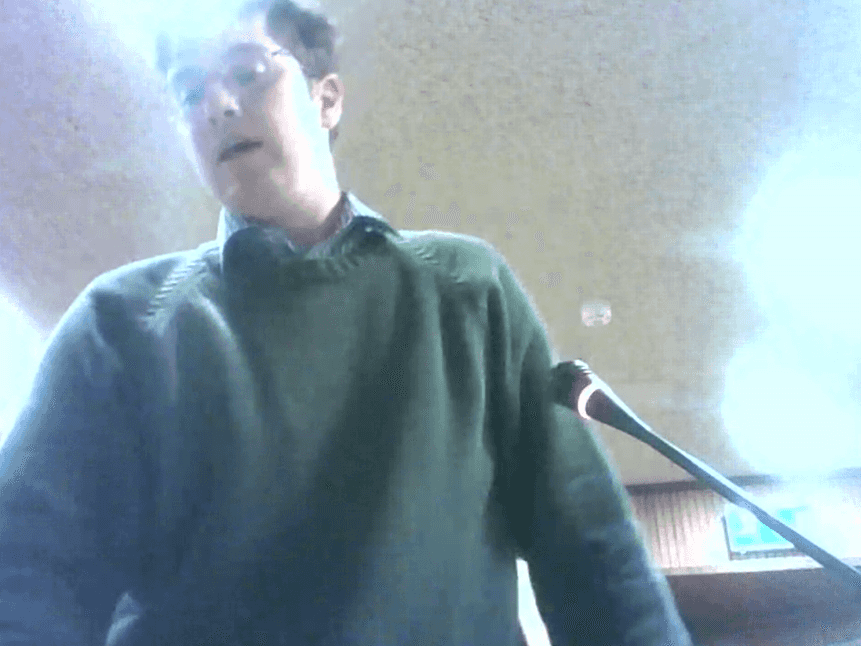Air Quality Action Plan (Part 2 - Full Council 26th April 2022)
Adoption of the Air Quality Action plan at Full Council

Arguably the main item of business at full council this evening was the Clean Air Action Plan, this was an issue I spoke on at the last Full Council meeting in February (click here also to see some of the recent air quality trends) and yesterday saw the adoption of the policy, following consultation. I spoke in support of this plan and also sought, and received, helpful assurances excluding coercive measures from being included under delegated powers.
It is important to exclude coercion in this area for a number of reasons. Some are obvious and I addressed them in February, but there are two others which might be considered relevant in this case, even to those who are relatively unconcerned about liberty in general.
Firstly, recent years have seen substantial improvements in air quality, these have been delivered, and will continue to be delivered in future years, without recourse to local coercion, and without much in the way of mass coercion either (though changing upstream rules, for example for vehicle manufacturers; changes in MOTs, may well have had an effect too).
Secondly, the implementation of coercive measures is often a massive distraction from what can be achieved on a non-coercive basis. The importance of this bandwidth effect should not be underestimated; avoiding coercion (and, where possible, ruling it out at an early stage) simply leaves a lot more thinking space available to do the non-coercive stuff better.
The following is a rough transcript of the video:
Cllr. Pender: "I would like to welcome the plan, as it is, but also to express one reservation about some of the supplementary information that's come through this evening. Firstly the very good things about the plan: This plan consists substantially of non-coercive behaviour campaigns which have been very effective over a period of time and we see an improving trend in air quality which we continue to monitor. We have substantial action to reduce our own emissions as a council as well as using interactions with the private sector; using our megaphone to incentivise the private sector to reduce their emissions, and to praise them for that, to leverage a reduction in emissions. I was struck by the arguments made at cabinet in favour of the Air Quality promotions officer to run these softer campaigns.
"Clearly any form of public spending is a coercive matter, because taxation is raised coercively, but beyond that the document is broadly an attempt to convince rather than to coerce, and I very much welcome that. I think that can work, and it has worked, and I predict we will continue to see a substantial reduction in the emissions of Nitrogen Oxides and Particulates, under this plan.
"The one reservation I have is the last part of the supplementary information. I'm told it's not particularly unusual to allow the portfolio holder and officers between them to update the plan within the course of its duration, to remain relevant. I really hope that we will avoid any coercive measures coming in through that mechanism, particularly any fines or zoning where certain vehicles are prohibited, or a charge to drive or anything which requires parking to be more surveillance heavy than currently. I'm sure I'm about to hear some reassurance, having given indication of the tenor of this speech to the leader in advance - I'm sure I'm about to hear some reassurance which will allow me to vote in favour of this plan this evening."
*The leader of the council pointed out that, the supplementary information was not entirely new in our information packs as it had come before cabinet. [Although I had chosen to attend Cabinet last week, not being a member of Cabinet, I had not thoroughly reviewed the supplementary paperwork for Cabinet]. The leader was also able to say:
"I can assure Cllr. Pender that the sort of coercive behaviors or instruments that he is talking about would need full Council approval, and therefore it's not covered in item d."
An answer which I warmly welcomed.
*********************
Additionally yesterday evening, effectively, saw the handover of the Chairmanship of the council. The New Chairman (who will be confirmed in post at the next Annual Council) has decided on a simpler style in relation to debate and questions. It seems that, for most items, rather than trying to separate “Questions” from “Debate” she will take the two together. On balance this is probably rather a good move as questions and debate are often conflated in any case. Though, of course, it still remains open to the new Chairman to explicitly separate questions and debate for any particularly technical item where she anticipates many members will have significant points they wish to clarify.
While the new style is good and takes very little getting used to, its introduction did catch me on the hop during the first item this evening, the safeguarding policy. I had intended to speak in the debate following questions, but found that the opportunity for questions had been the debate. In any case, many important safeguarding matters, including the investigation of almost all allegations, fall under the remit of KCC rather than SDC, and it is in the area of investigations and how to deal with allegations justly, where safeguarding policies can sometimes fall down and fail to uphold basic principles of justice.